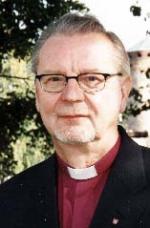|
12 Septiembre 2011 19:00 | Greek Church
|
Human ecology and sustainability. From luxury to necessity by Huotari
|

Obispo luterano, Finlandia
|
Religion is a positive force for ecological change
Awareness of the state of the globe creates threatening images: the climate is damaged; water and the soil are polluted. The diversity of life is in danger. We have many negative visions of the future of life. Negative visions paralyse.
The debate and action on ecology also needs positive visions. They exist in all religions. Religion can be a positive force for change to counterweight pessimism. Our mission is to serve ecological purposes with positive visions.
I will present four positive Christian visions that encourage us to act for sustainable development and just use of natural resources.
1. The goodness of God's deeds belongs to all creation.
"The nature is my church." Many people are saying this in my homeland Finland. In my country there are lots of forests and lakes. Walking in nature quiets our minds in the face of the great mystery of life. We feel that we are part of something larger. Nature has a spiritual meaning to us.
Nature is sacred because it is created by God. Respecting what is sacred leads to thankfulness for the gift of life. Praising the Creator is part of our spiritual life. When there is respect of the sacredness of creation and praise for the Creator, then nature is not seen only as a means to satisfy human needs. The goodness of creation and mercy belong to all creation.
A worldview without God gives us too much power to work only for our own interests. Solving ecological crisis needs spiritual visions in which people more strongly are aware of their responsibility to God and of their connection with creation.
2. Respecting the conditions of nature is a precondition of wellbeing.
The purpose of nature is not only to satisfy human needs. All life wants to live. Animals and plants as well as people strive to live. This presents an ethical duty to respect life in all its forms.
Western humanism and also the scientific way of thinking make a difference between humans and the rest of nature, body and soul, material and spiritual. The sense of life's unity and comprehensiveness are part of spiritual life. It is a counter reaction to that dualistic and hierarchical way of thinking.
However, we as humans have a unique position because we can hear God's voice and feel responsible in front of Him. This Christian idea stressing that people are unique has also been abused when people have begun satisfying their needs without caring for the needs of the rest of creation. Now we need to re-interpret our spiritual traditions. Ecological change requires that we abandon the basic view that nature exists only for humans and to satisfy our needs.
3. Moderate consumption improves good life in a versatile and just way.
People have not come into the world only to produce and consume. To counterbalance the dictatorship of money we must make room for people's spirituality, for life that is rich spiritually and socially and for the sense of responsibility for both nature and other people. Religion is a counterweight. It is a force for change.
Moderate consuming is the ideal of all religions and also that of Christianity. At the moment the biggest efforts are made to create new excessive needs for affluent people. Wealthy people need to exploit natural resources to benefit from wealth. But the poor are the ones who suffer the most when nature is therefore destroyed.
But also the poor people destroy natural resources unduly when they have no alternatives or do not know about them. Still, it is difficult to introduce environmental programmes in developing countries. There is fear that they are a threat to economic development and the improvement of living conditions. Good life to people and nature can only come true when we pay attention to the conditions of the poor.
Western lifestyle consumes the most. It is good to look for models in other cultures. Thinking and acting must turn into carrying out justice, balancing and protecting nature.
4. The purpose of humanity becomes real in serving love.
According to Christian faith the characteristics of God are serving, loving and suffering for people and the whole creation. Humans are images of God. When God loves His creation servingly and caringly, also those He has made in His image and likeness should do the same.
When we are partakers of God's mercy, then we have thankful love for God's commandments and for obeying his will. Love for our neighbour extends also to the generations to come. We know for example that the world's oil reserves will last for four generations and uranium reserves for three generations. This knowledge combined with love for the coming generations motivates us and gives direction to actions in practice.
Love that extends to the poorest and to the creation is the deepest and most genuine humanity. When we do good and act ethically, we are rewarded with the feelings of satisfaction and joy.
|
|
|
|

